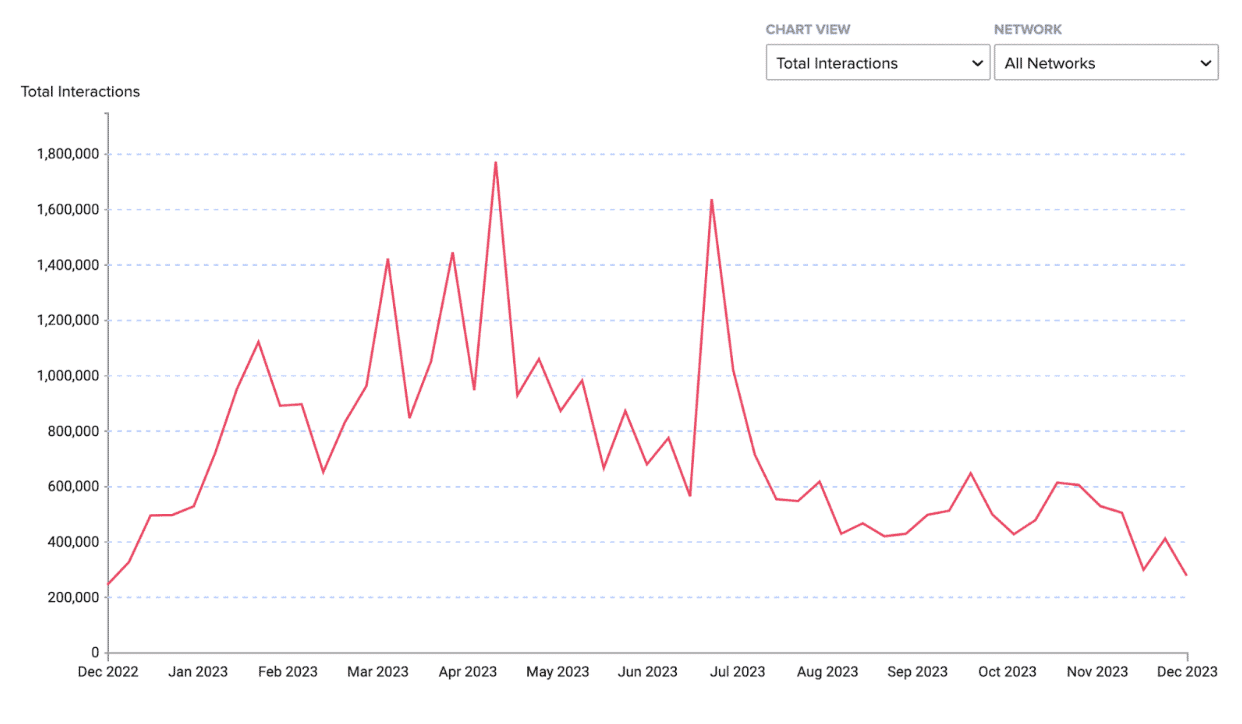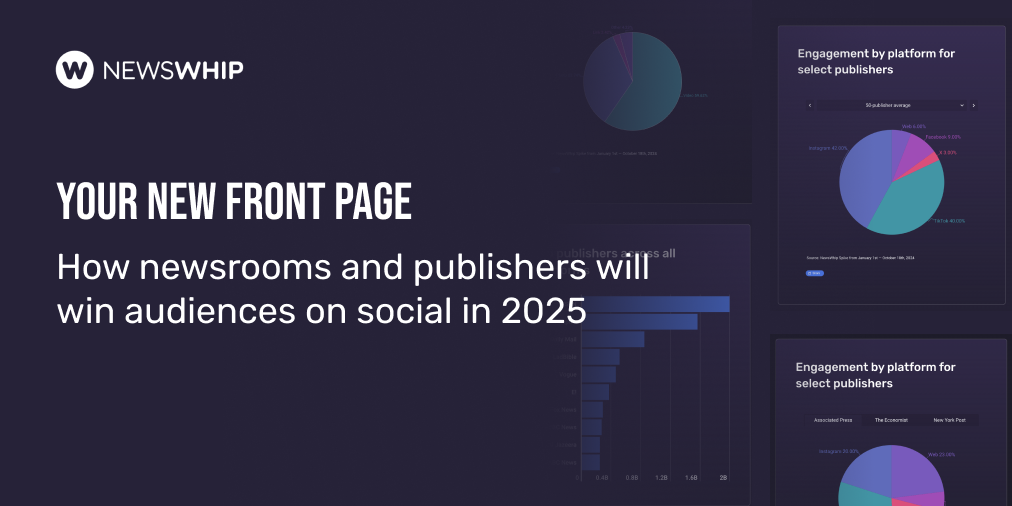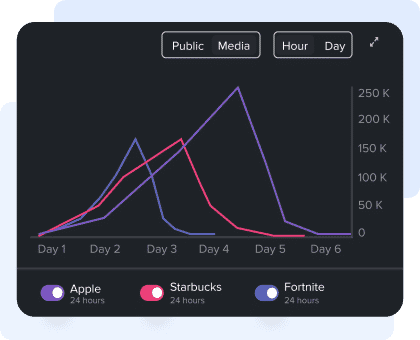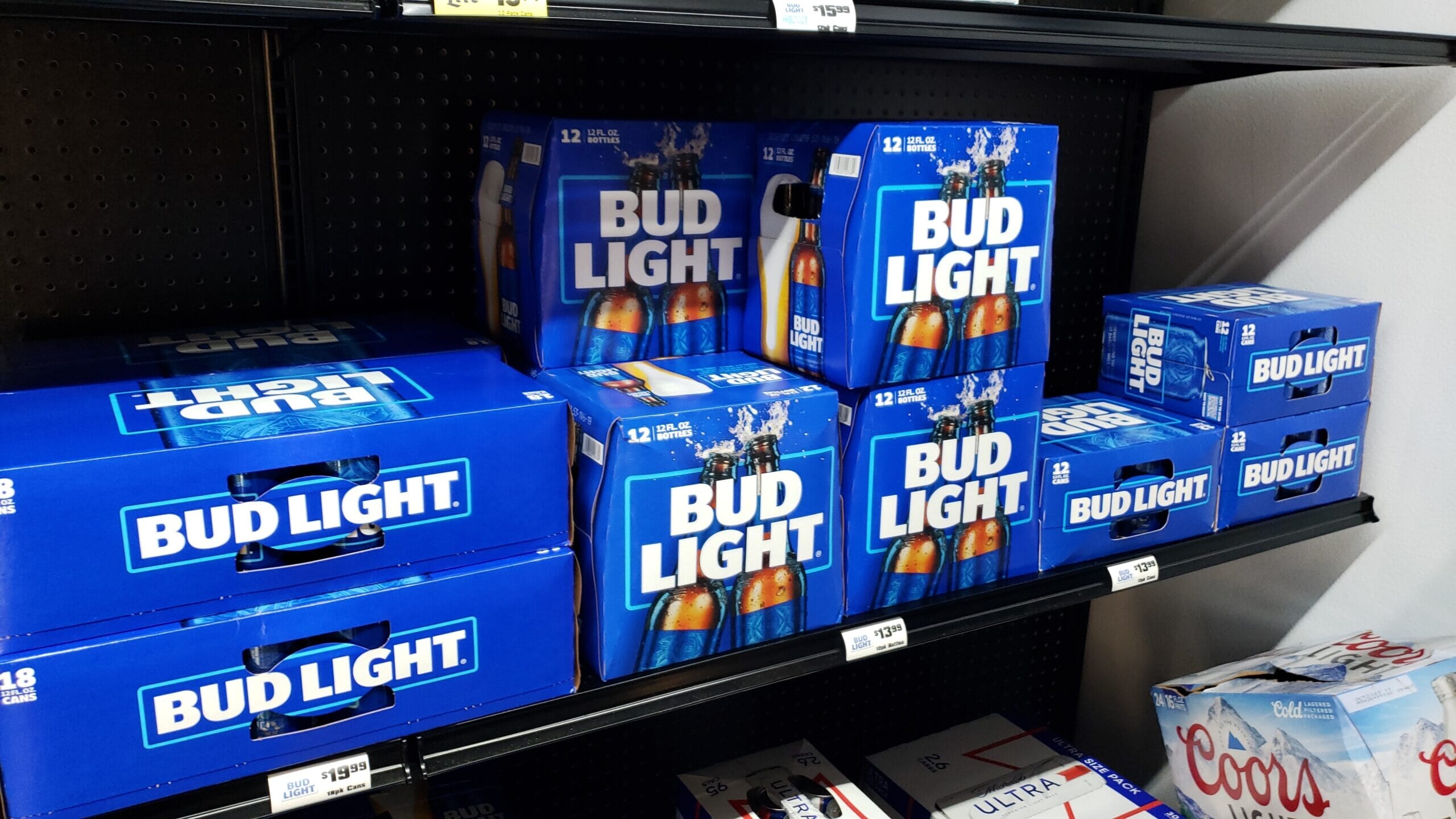We’ve been reflecting on all that has happened in 2023, and future-gazing into what 2024 will bring, which is particularly interesting to us as marketers. We love to see how viral trends and news erupt on the internet, but at NewsWhip, we’re also working to understand what it all means, especially as our media ecosystem becomes more fragmented.
So, based on everything we’ve seen this year — and with a little help from NewsWhip Spike — here are our content team’s predictions for 2024.
1. Artificial Intelligence usage will mature
2023 was the year of AI, and we entered the year following an explosion of hype on Twitter after ChatGPT’s launch. Attention rose, and then slightly fell away again after July.
My suspicion here is that the momentum faltered a bit when people realized that being able to generate a poem about commuting in the style of Henry David Thoreau is all well and good, but they wanted an actual application of the tech that helps them in their daily lives, not just a magic box for internet creativity.

We’ve leaned into trying to define that category in our own industry with the launch of our AI Digests, which automatically summarize the top stories for any search or topic of interest and send them straight to your inbox, and it seems clear that 2024 will be the year where we start integrating AI tech into our workflows, rather than treating it as just the latest shiny new toy.
Interestingly, most of the top articles this year were warning of the danger of AI, from James Cameron to Google’s ‘Godfather of AI’, so it may also just be that people’s skepticism of the tech has worn off as the year has progressed. Either way, AI is here to stay, and you can expect to see it integrated in a lot more places in 2024.
2. The first TikTok election(s)
3 billion people are going to the polls next year, including the likes of Mexico, Indonesia, Pakistan, India, and the United States. That’s a lot of election content, all at once. And some of the platforms that are now most popular, like TikTok, were nowhere near as established as they are now, so in America at least we’re going to see what impact these will have on the discourse in almost real time.
@11thhourmsnbc @nbcnews reporter Kalhan Rosenblatt on the "Trump fatigue" among Gen Z right now: #trump #donaldtrump #formerpresidenttrump #formerpresident #usgovernment #politics #republicans #democrats #maga #2024election #trumpindictment #alvinbragg #msnbc #stephanieruhle #fyp ♬ original sound - 11th Hour MSNBC
Strategists will already be coming up with their campaigns to get Gen Z to vote, while also keeping older generations engaged through traditional media. And speaking of AI above, there’s a media literacy and misinformation beyond deep fakes, as the technology becomes more convincing and harder to distinguish from reality. Verification and fact checking will be crucial, and it’s something we’re also working on here at NewsWhip.
3. Social media will continue to become more disparate
The internet is becoming a fractured place again. Social media has been trending away from the monolithic ‘one big story’ for a while now. It used to be a weekly occurrence that there would be a water-cooler moment that went viral on social media that everyone had seen, but now smaller versions of these moments are happening for different groups based on their interests.
Charlie Warzel at The Atlantic and Ryan Broderick at Garbage Day have both written compellingly about the internet diverging away from what we knew it to be until very recently, and I’m inclined to agree with the take that the internet of pre-2020 may be gone.
Some of this is just due to competition as much as anything else. New, highly successful platforms have emerged in the form of TikTok and Instagram — both solidifying their position as not only visual sharing apps but cultural and newsgathering touchstones.
So what does that mean for the social internet as we know it?
My semi-controversial take is that X (fka Twitter) has always been somewhat over-indexed amongst the media despite it not being where most people are because it’s where most media people are, and there’s a proximity to power there that you don’t feel on other platforms in the same way. It seems to have lost a bit of that in the last year as the media and politicians have used it less, and even those amongst us (like me!) that still check it regularly are likely using it less than they were in the old days.
Facebook is still Facebook — despite moving away from news and politics since the last election it still has 2 billion users. As such, it’s inevitable that news does still get shared on the platform in a big way, it just doesn’t appear in the feed as much as it once did. Where it does appear is in the groups and communities that people cultivate on the platform, the places where people choose to spend their time.
And that’s the key point.
The millennial photo dump giving every life update to every acquaintance you’ve ever interacted with is gone. People are building communities in different spaces, and sharing with subsets of the people they know and interact with. What complicates this narrative is that some of these communities are built algorithmically. Yes, TikTok lets you follow people, which increases your chances of seeing their posts, but we don’t know how it does that. TikTok (and other platforms) are building your community for you and showing you the content that it thinks you’ll like, based on your unstated and sometimes unconscious preferences. We’re building a series of walled gardens on different platforms, but we don’t know what they’re made of or who’s here with us.
And it leads to some bizarre outcomes. As noted in the Atlantic piece I mentioned above, many people were shocked when Netflix released its list of top shows this year, which many claimed never to have heard of, let alone watched. That’s going to be true on social media too — there will be whole cultural events happening on TikTok, Reddit, X, Facebook, and Instagram that look nothing alike, but will be of crucial importance to those participating in them.
As always, for brands and anyone interested in how content is engaged with on social media, it’s going to be important to understand the conversation on different platforms, and decide when and where to engage with those self-constructed audiences and communities.
That’s me done, I’ll hand it over to our Marketing Manager Haley Corzo for her predictions for next year.
1. News publishers will see increased success on TikTok
While trends emerge on TikTok all the time, short-from video has also changed news consumption habits, especially among younger audiences who don’t rely on traditional sources.
Publishers have increasingly utilized Instagram Reels and TikTok for reporting this year, with the likes of BBC, Daily Mail, and the New York Times all earning exceptionally high engagement to this bite-sized style of content, which we discussed in our blog this past fall.
Short-form video has allowed us to stay informed on important topics, breaking news, and watch world events happen in real time. One can argue that this has also created a greater sense of desensitization in our society, as we quite literally have access to the unfiltered version of everything going on around the world (good or bad) at our fingertips. But on the other hand, it means that people everywhere are more connected than ever before, and younger generations who don’t have the time or the attention span to turn on the evening news are more informed than ever too. Publishers have realized that, and we think they’re betting on TikTok.
@dailymail It’s timeeeeeeeee ☃️🪩 Mariah Carey has OFFICIALLY been defrosted! #defrostmariahcaery #christmas #queenofchristmas #christmastime #mariahcarey #fyp #pop ♬ original sound - Daily Mail
Oftentimes a video on TikTok brings these publishers significantly more engagement than a web article about the same topic does. The output of videos might be considerably less, but the amount of people interacting with them is enough to show that they’re resonating. Just in the last month alone the Daily Mail has received over 15 million engagements to its TikToks, plus the BBC has seen 4.1 million, CNN has seen 3.2 million, and our honorable mention (although not hard news) is ESPN, which saw 96 million engagements. The list goes on, but by now you get the idea — if there’s one thing publishers should be considering in 2024, it’s TikTok.
2. Movies move back into the mainstream
This year people decided that they liked going to the movies again, and that can really be attributed to the biggest summer blockbusters we’ve seen in some years — Barbie and Oppenheimer.

We watched as the lead up to their same day release created a massive amount of hype, and naturally, a friendly rivalry that sparked a phenomenon known as “Barbenheimer.” Conversations and memes erupted online with the public discussing the most optimal order of watching each movie in one day. I can’t remember if we landed on Oppenheimer and then Barbie, or vice versa, but I prefer the latter.
What’s even more notable is the way Barbie was able to completely dominate pop culture, from an Airbnb Dreamhouse and countless fashion and CPG brands releasing Barbie collaborations, to fans dressing up in their best Barbiecore outfits at movie theaters. It brings me back to the total insanity that the Twilight franchise created, but with probably 10x the marketing budget.
That’s why what’s happening is relevant, though, and why we think it will continue. Since covid we’ve been missing the craze that gets built around a big blockbuster, and Hollywood strikes postponed the release of some highly anticipated movies, such as Dune and Deadpool 3 which are now confirmed for 2024. Let’s not forget that the two biggest pop stars in the world premiered the movie version of their world tours this year (thank you Taylor and Queen Bey), offering fans an alternative to paying thousands to attend a concert in person.
All in all there is great opportunity to keep this momentum going throughout 2024, largely because of the communities that were established among 2023’s big hits. Whether it be Barbie, Oppenheimer, or Taylor’s Eras tour, people gravitated towards movie theaters because of the experience, not just the films themselves.
3. It will be a year for sports and the people playing them
The Super Bowl will kick off next year with the always anticipated ads and at least one more cringey comment about Taylor Swift and Travis Kelce (whether the Chiefs make it there or not), but the real event to watch in 2024 is the Paris Summer Olympics, and specifically the olympians themselves.
It’s obvious that these athletes will make headlines and capture loads of public interest, but it’s the why that I think will matter the most, and it doesn’t necessarily mean it will be a direct result of their performance. More and more athletes have chosen to candidly speak out about their mental health struggles, addressing the pressure they deal with not only from themselves but from the public who view a lot of sport as mere entertainment. Covid made this more apparent during the Tokyo Olympics where conversations around mental health were finally able to break through, with Simone Biles leading the way into a broader cultural discussion.
Biles, along with several other athletes such as Naomi Osaka — who also famously addressed her mental health issues in 2021 — are making a “comeback” at the 2024 Olympics according to media coverage, so it feels inevitable that these types of conversations will emerge again.
@katienageotte Reply to @srynotliv I think I’m set on red, white, and blue clothes for the rest of my life 😍😭 #olympics #tokyo2020 #teamusa #gear #haul #clothes ♬ Wrestling entrance theme image - Masaru Nakajima
And we can’t forget about brands. TikTok had just become all the rage when the Tokyo Olympics were underway, and several brands saw success on the app by tapping into the athletes’ influence. Kim Kardashian’s brand Skims was a USA partner for loungewear and got notable attention, and Nike and Oakley were also featured in a video that earned more than 11 million views.
TikTok has proven to be a reliable platform for athletes to connect with their fans, and brands pushing to be a part of those conversations is a trend that is likely to continue.












